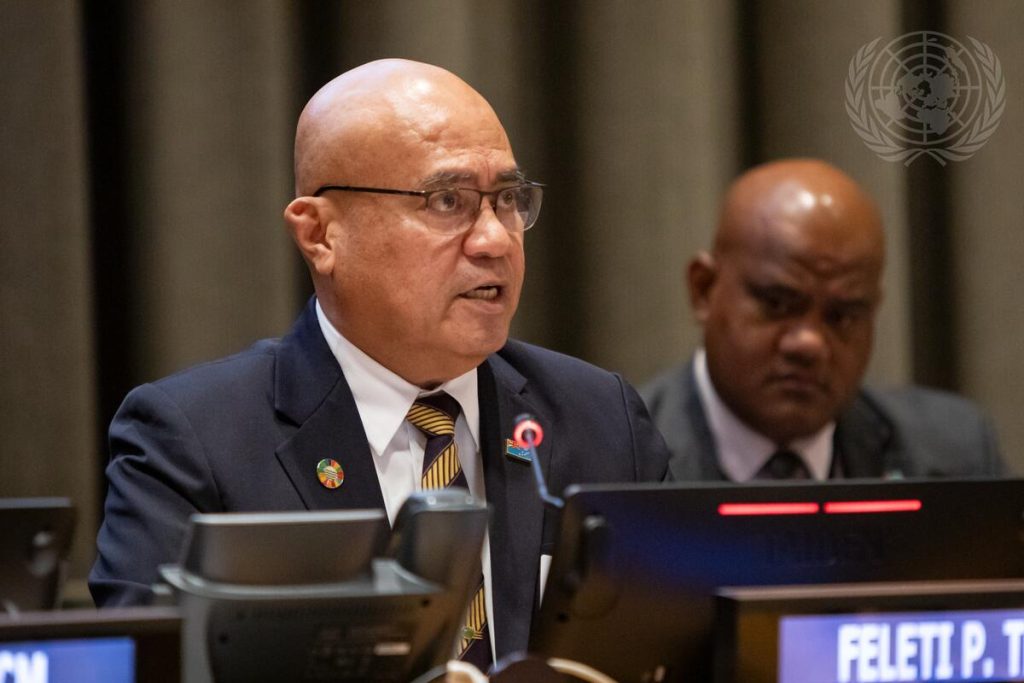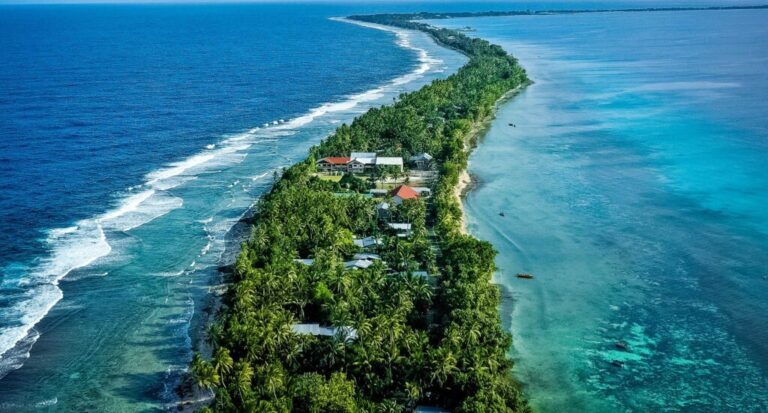Tuvalu’s Prime Minister Feleti Teo Wednesday called on the world to face the life-or-death challenge of rising sea levels head-on.
“Today is our historical opportunity to turn the global tide and to embark on a common path that secures prosperity, dignity, and rights to all affected countries and communities,” said PM Teo at UN High-Level Meeting on addressing the existential threats posed by sea-level rise in New York.
He said that this summit indicates a new era of international cooperation, raising awareness of the multi-dimensional nature of these threats and marking “the take-off” for global efforts to shape an ambitious Assembly declaration in September 2026.
“The existential threat we face is not of our making. But it will remake us,” he warned, stressing the urgency surrounding the crisis faced by low-lying nations.
“Livelihoods are destroyed, families gradually move, community cohesion is tested, heritage is lost, and eventually, the very fabric of nations becomes increasingly threatened,” he said.
For many communities affected by climate change, the impacts are not distant projections but harsh realities they endure daily.
“These are the hard realities we experience today, not the projections of a coming future,” he highlighted, emphasising the plight of over one billion people in vulnerable regions.
“In this century, many of the small island states and low-lying countries will lose considerable territory to rising sea with some, like my country, running the risk of becoming largely uninhabitable,” Teo alerted.
“As the ocean rises, salt water permeates into the aquifers that provide our drinking water. Higher tides, and with increasing storm intensity, devastate our villages and fields throughout the year. Flooding increases soil salinity, reducing crop yields and weakening trees. Infrastructure such as homes, roads, and power lines are washed away. Higher land on which to rebuild does not exist. Our peoples will be unable to exist on the islands and shores they have called home for generations,” said Teo.
Despite the urgency of the situation,Teo said that “agreements reached at annual climate summits and international meetings say nothing about sea-level rise, ignoring the plight of entire nations and deterring the voices of the one billion impacted.”
He highlighted the current summit as a critical turning point, stating, “This Summit finally places sea-level rise at the top of the international agenda through the remarkable and unprecedented action of the UN General Assembly.”
Looking to the future, Prime Minister Teo outlined clear expectations for a strong declaration from the General Assembly, emphasising that it must be a strong pronouncement in support of the needs of the one billion people, reaffirm unwavering commitment to sovereignty, dignity, prosperity and rights, and action-oriented and comprehensive.
“To begin with, we must ascertain the principle of statehood continuity as a tenet of international law and cooperation, affirming that statehood cannot be challenged under any circumstances of sea-level rise. Our membership in the United Nations and its specialised agencies is permanent, notwithstanding the impacts of climate change,” he said.
He also called for reaffirming that maritime zones established and notified to the Secretary- General of the United Nations (UNSG) in accordance with the United Nations Convention on the Law of the Sea (UNCLOS) and the rights and entitlements that flow from them, remain intact, without reduction, notwithstanding any physical changes connected to climate change sea-level rise.

He urged the international community and regional institutions to enable climate mobility pathways that allow for safe, orderly, and dignified movement for displaced individuals, addressing existing legal gaps and devise needed international legal frameworks to protect human rights.
Teo proposed additional measures, such as developing concrete programmes for the international community to safeguard unique cultural and heritage assets, both tangible and intangible.
He emphasised the need for establishing dedicated and innovative financing mechanisms to support the positive adaptation journeys of the most vulnerable communities. This includes ensuring that climate financing reaches the local level without burdening countries suffering from repeated disasters with increasing debt, ultimately creating better economic opportunities and resilient livelihoods for future generations.
Teo stressed the importance of knowledge, data, and science in anticipating and planning for the impacts of sea-level rise, advocating for a dedicated platform to share best practices, innovative solutions, and necessary data to support informed disaster risk management decisions in affected countries.
“Finding the right solutions will require statesmanship and empathy, beginning with an acknowledgment that a situation globally caused must also have a globally just and equitable solution,” he stressed.
He welcomed the launch of the Communities Climate Adaptation Facility, which aims to provide climate quick impact grants to affected communities.
Teo urged donor communities and climate financing institutions to channel their support through this initiative, highlighting the need for stronger partnerships to address these pressing challenges.
“I invite you to join the Coalition for Addressing Sea-Level Rise and Its Existential Threats co-chaired by Tuvalu and Germany and along with ten strong champions: Morocco,Romania, South Korea, Malta, Denmark, Costa Rica, Palau, Antigua & Barbuda, New Zealand and Bangladesh.
“As a coalition for higher ambition, we will continue to work with all of you to advance stronger advocacy, raise global awareness, and ensure higher commitments in support for the affected countries and communities.”
Teo reiterated the urgency for immediate action and collaboration: “We cannot afford to wait any longer.”













